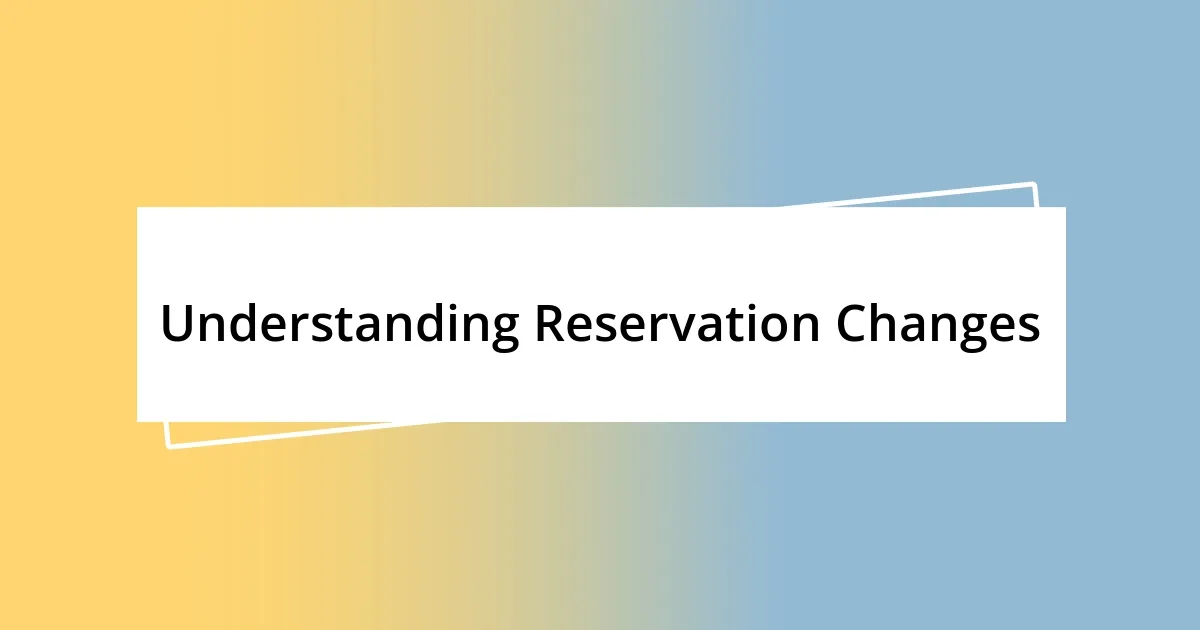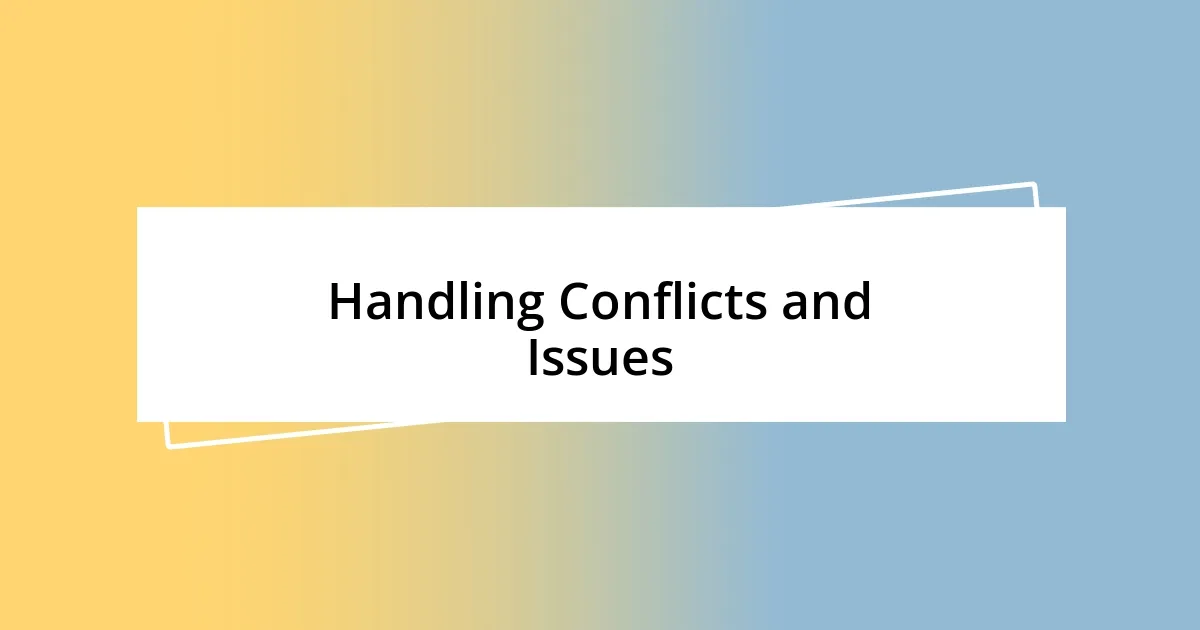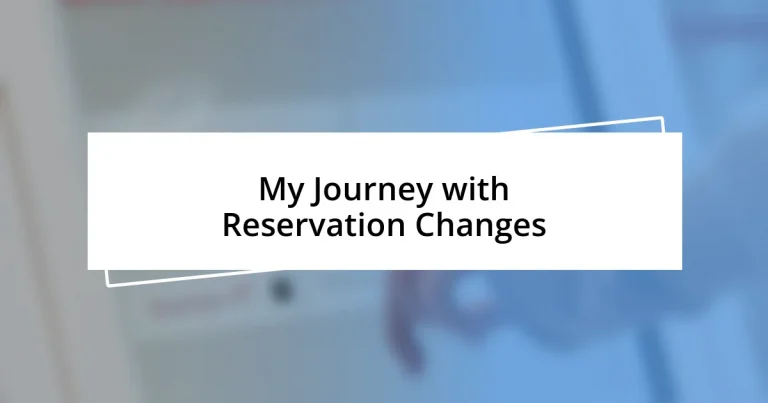Key takeaways:
- Understanding reservation policies and opting for flexibility can significantly reduce stress during unexpected changes.
- Being proactive with bookings and changes helps avoid hefty fees and enhances travel experiences.
- Handling conflicts calmly and asserting oneself can lead to favorable outcomes and resolutions.
- Thorough research and documentation are crucial for effectively managing reservation changes and ensuring preparedness.

Understanding Reservation Changes
Understanding reservation changes can often feel overwhelming, especially when unexpected circumstances arise. I remember a time when a sudden family emergency forced me to rearrange my travel plans at the last minute. It made me realize how crucial it is to stay informed about the policies of the service providers—I wish I had known what options were available before.
The emotions tied to reservation changes can swing from frustration to relief in an instant. Have you ever found yourself staring at a list of options, unsure of which way to go? That moment when I found a flexible cancellation option brought a wave of relief; it transformed my panic into a sense of control. Knowing that I could modify my plans without hefty penalties made a world of difference.
Understanding the intricacies of reservation changes also means recognizing the varying policies different companies implement. For instance, during my last trip, I discovered that the airline I chose had generous rebooking options, while another less flexible airline left my friend scrambling for solutions. This experience taught me that digging into the fine print can save not just money, but also a great deal of stress. Doesn’t it feel empowering to be prepared?

Importance of Flexibility
Flexibility in travel plans isn’t just a nice-to-have; it’s essential for peace of mind. I wish I had known just how vital this was before I jumped into planning my trip to Italy. I had everything mapped out, only to find that unexpected weather changes prompted my plans to go sideways. Fortunately, I had opted for accommodations with a flexible cancellation policy, allowing me to reschedule without losing my deposit. That little bit of foresight saved my trip and my sanity.
Here are a few key reasons why flexibility is so important:
- It alleviates stress during unforeseen circumstances.
- It allows you to adapt plans without incurring additional costs.
- It enhances your overall travel experience by enabling spontaneous decisions.
- It provides a safety net in case of emergencies or unexpected events.
- It reduces the anxiety around planning, knowing that adjustments are possible.
Understanding these aspects can truly transform your travel experience.

Common Reasons for Changes
Travel plans can change for a multitude of reasons, often catching us off guard. One common trigger is unexpected emergencies. I faced this during my last holiday when my pet got sick right before my trip, and I had to reschedule everything. It was stressful, but knowing I could change my reservation without a steep fee lightened the burden considerably.
Another reason for changes is work commitments that can crop up unexpectedly. I remember having to juggle my schedule when a last-minute project came in, leading me to adjust my planned getaway. Having options to switch dates made it manageable, allowing me to balance my professional and personal life without too much hassle.
Personal health can also prompt last-minute changes to travel plans. I once found myself under the weather just days before a planned vacation. The thought of losing my deposit was heartbreaking, but thankfully, the airline provided a partial refund option that saved me financially. Such situations highlight the importance of checking the policy details before booking, as they can make a significant difference when life doesn’t go as planned.
| Common Reasons | Impact on Travel Plans |
|---|---|
| Emergencies | Require urgent changes, can induce stress. |
| Work Commitments | May lead to rebooking, juggling schedules. |
| Personal Health | Can incur financial loss if policies are not flexible. |

Steps to Change Your Reservation
Changing your reservation can feel daunting, but breaking it down into manageable steps really helps. First, always check your booking confirmation for the specific policy details. I remember staring at mine, heart racing, and sweating over the fine print. It feels overwhelming, but knowing what you can and can’t do saves you a lot of headaches later on.
Once you’re clear on the details, reach out to your travel provider. Don’t be shy! I’ve found that a quick call or email can go a long way. When I needed to change my flight home last summer, the representative I spoke to was incredibly understanding. They walked me through my options, ensuring I got the best alternative without incurring hefty fees. Isn’t it amazing how just asking for help can ease so much pressure?
Finally, once you’ve made the changes, confirm everything in writing. I can’t stress this enough! After adjusting my hotel dates for an international trip once, I received fresh confirmation email within minutes. I felt an instant wave of relief wash over me, knowing everything was set. It’s the best peace of mind: knowing you’ve handled the hiccup and can now focus on the fun parts of traveling. Have you ever had a similar experience?

Tips for Avoiding Fees
To avoid those pesky reservation change fees, being proactive is key. Whenever I book a flight or hotel, I always look for flexible options. On one occasion, I opted for a fare that included free changes. It turned out to be a lifesaver when I had to alter my plans for a family commitment. That little extra investment made a world of difference when it came to stress management.
Another tip I’ve found invaluable is to book changes as soon as I know something’s off. There was a time when I hesitated, hoping my initial plans would work out, but that just resulted in a larger fee later. I now make it a point to assess the situation early; it’s about making quick decisions rather than waiting and risking more expense. Isn’t it amazing how that slight shift in mindset can save you money?
Lastly, I never underestimate the power of loyalty programs. Being a member can sometimes unlock options that aren’t available to general customers. For instance, during a recent trip, I had enough points that allowed me to change my reservation without any fees attached. It felt great to reap the rewards of travel loyalty. Have you considered how your loyalty might buffer against unexpected charges?

Handling Conflicts and Issues
Handling conflicts during reservation changes can be a frustrating experience, but I’ve learned that staying calm makes a significant difference. I remember a time when a hotel overbooked my room after a long day of travel. Instead of panicking, I took a deep breath and approached the front desk politely. To my surprise, they found me a suite at no extra charge! Sometimes, a little kindness goes a long way in resolving conflicts.
It’s also essential to know how to escalate an issue when necessary. I’ve had moments where initial representatives weren’t able to help, leaving me feeling stuck. On one occasion, after explaining my situation to a supervisor, I was not only granted a fee waiver, but I also received a meal voucher for my trouble. Have you ever thought about how asserting yourself can change the outcome of a conflict? It’s empowering.
Lastly, reflecting on your experiences can provide invaluable lessons for future travels. After dealing with a last-minute flight change that stressed me out, I vowed to create a backup plan whenever I booked. Since then, I’ve embraced the habit of keeping a list of alternative options. It’s comforting to know I’m better prepared now—don’t you agree that a little preparation can turn potential headaches into manageable hiccups?

Lessons Learned from My Experience
When it comes to navigating reservation changes, one of the biggest lessons I’ve learned is the value of thorough research. A few years back, I faced a situation where a change in my itinerary felt overwhelming. I remember feeling lost, but after diving deep into forums and travel blogs, I discovered a wealth of resources. Understanding policies from different airlines and hotels made me feel empowered. Have you ever found solace in knowing you’ve done your homework?
Another valuable insight I gained is the importance of documenting every communication. There was a time I was in a heated exchange regarding a schedule change when I suddenly recalled that I had saved the email confirmation. By providing that proof, I not only resolved the issue swiftly but also felt a rush of confidence. Isn’t it reassuring to have tangible evidence when things go awry?
Lastly, one lesson that really resonates with me is the significance of embracing flexibility, both in travel plans and mindset. I vividly remember a trip where everything seemed to go wrong—flights delayed, hotels overbooked—but instead of letting that ruin my experience, I opted to explore the city unexpectedly. That spontaneous adventure turned out to be one of the best parts of my trip! How often do we cling to our plans when a hidden gem lies just around the corner?












